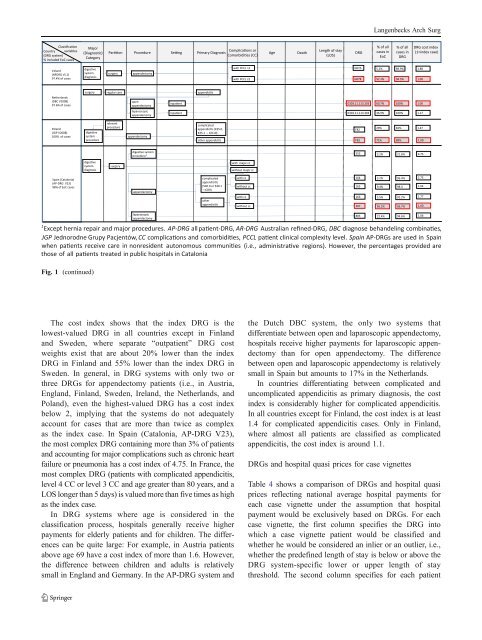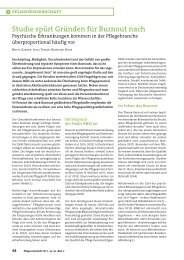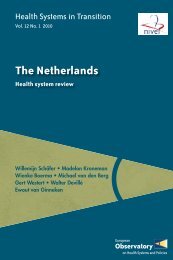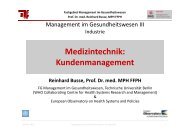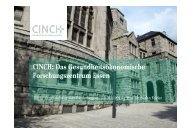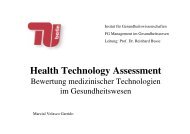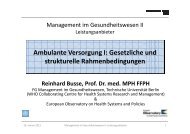Appendectomy and diagnosis-related groups (DRGs ... - TU Berlin
Appendectomy and diagnosis-related groups (DRGs ... - TU Berlin
Appendectomy and diagnosis-related groups (DRGs ... - TU Berlin
Create successful ePaper yourself
Turn your PDF publications into a flip-book with our unique Google optimized e-Paper software.
Fig. 1 (continued)<br />
The cost index shows that the index DRG is the<br />
lowest-valued DRG in all countries except in Finl<strong>and</strong><br />
<strong>and</strong> Sweden, where separate “outpatient” DRG cost<br />
weights exist that are about 20% lower than the index<br />
DRG in Finl<strong>and</strong> <strong>and</strong> 55% lower than the index DRG in<br />
Sweden. In general, in DRG systems with only two or<br />
three <strong>DRGs</strong> for appendectomy patients (i.e., in Austria,<br />
Engl<strong>and</strong>, Finl<strong>and</strong>, Sweden, Irel<strong>and</strong>, the Netherl<strong>and</strong>s, <strong>and</strong><br />
Pol<strong>and</strong>), even the highest-valued DRG has a cost index<br />
below 2, implying that the systems do not adequately<br />
account for cases that are more than twice as complex<br />
as the index case. In Spain (Catalonia, AP-DRG V23),<br />
the most complex DRG containing more than 3% of patients<br />
<strong>and</strong> accounting for major complications such as chronic heart<br />
failure or pneumonia has a cost index of 4.75. In France, the<br />
most complex DRG (patients with complicated appendicitis,<br />
level 4 CC or level 3 CC <strong>and</strong> age greater than 80 years, <strong>and</strong> a<br />
LOS longer than 5 days) is valued more than five times as high<br />
as the index case.<br />
In DRG systems where age is considered in the<br />
classification process, hospitals generally receive higher<br />
payments for elderly patients <strong>and</strong> for children. The differences<br />
can be quite large: For example, in Austria patients<br />
above age 69 have a cost index of more than 1.6. However,<br />
the difference between children <strong>and</strong> adults is relatively<br />
small in Engl<strong>and</strong> <strong>and</strong> Germany. In the AP-DRG system <strong>and</strong><br />
Langenbecks Arch Surg<br />
the Dutch DBC system, the only two systems that<br />
differentiate between open <strong>and</strong> laparoscopic appendectomy,<br />
hospitals receive higher payments for laparoscopic appendectomy<br />
than for open appendectomy. The difference<br />
between open <strong>and</strong> laparoscopic appendectomy is relatively<br />
small in Spain but amounts to 17% in the Netherl<strong>and</strong>s.<br />
In countries differentiating between complicated <strong>and</strong><br />
uncomplicated appendicitis as primary <strong>diagnosis</strong>, the cost<br />
index is considerably higher for complicated appendicitis.<br />
In all countries except for Finl<strong>and</strong>, the cost index is at least<br />
1.4 for complicated appendicitis cases. Only in Finl<strong>and</strong>,<br />
where almost all patients are classified as complicated<br />
appendicitis, the cost index is around 1.1.<br />
<strong>DRGs</strong> <strong>and</strong> hospital quasi prices for case vignettes<br />
Table 4 shows a comparison of <strong>DRGs</strong> <strong>and</strong> hospital quasi<br />
prices reflecting national average hospital payments for<br />
each case vignette under the assumption that hospital<br />
payment would be exclusively based on <strong>DRGs</strong>. For each<br />
case vignette, the first column specifies the DRG into<br />
which a case vignette patient would be classified <strong>and</strong><br />
whether he would be considered an inlier or an outlier, i.e.,<br />
whether the predefined length of stay is below or above the<br />
DRG system-specific lower or upper length of stay<br />
threshold. The second column specifies for each patient


